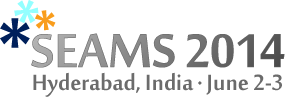Call for Papers
Important Dates
| Abstract Submission: | 15 January, 2014 |
| Paper Submission: | 22 January, 2014 |
| Notification: | 28 February, 2014 |
| Camera ready: | 14 March, 2014 |
The increasing complexity, distribution, and dynamism of many software-intensive systems, such as cloud-based, cyber-physical and mobile systems, are imposing self-managing capabilities as a key requirement. These systems must be able to adapt themselves at run-time to cope with the uncertainty associated with changes in the environment in which they operate, variability of resources, new user needs, intrusions, and faults. The goal is to preserve operation and react to changes with no (or limited) human intervention.
Solutions to complement software systems with self-managing and self-adaptive capabilities have been proposed by researchers from different areas including software architecture, fault-tolerant computing, programming languages, robotics, run-time program analysis and verification. Additionally, solutions have been proposed in related areas like biologically-inspired computing, artificial intelligence, machine learning, and control systems. This symposium focuses on applying software engineering aspects to these solutions, including methods, techniques, and tools that can be used to support the self-* properties like self-adaptation, self-management, self-healing, self-optimization, and self-configuration.
The objective is to bring together researchers and practitioners from many of these diverse areas to investigate, discuss, and examine thoroughly the fundamental principles, state of the art, and critical challenges of self-adaptive and self-managing systems.
Topics of Interest
We are interested in submissions from both industry and academia on all topics related to selfadaptive and self-managing systems. These include, but are not limited to:
Foundational concepts
- self-* properties
- feedback control
- algorithms for self-adaptation
- decision-making
- dealing with uncertainty
- runtime aspects
Languages
- formal notations for modeling and analyzing self-* properties
- programming language support for selfadaptation
Constructive methods
- requirements elicitation techniques
- reuse support (e.g., patterns, designs, code)
- design and architectural support
- enhancing systems with self-adaptive features
Analytical methods
- evaluation and assurance for self-* systems
- verification and validation of self-adaptive and self-managing software
- frameworks for analyzing self-adaptive and selfmanaging software
- testing of self-adaptive and self-managing systems
The following application areas are of particular interest: mobile applications, cloud computing, resource provisioning and optimization, autonomic computing, problem determination including logging, analysis and diagnostics, smart user interfaces, service-oriented systems, dependable computing, autonomous robotics. We also encourage authors the submission of exemplars.
After the symposium, a set of selected papers will be invited to submit to the ACM Transactions on Autonomous and Adaptive Systems (TAAS).
Paper Submission Details
We are soliciting two types of papers: long papers (up to 10 pages) and position papers for new ideas (up to 6 pages). Long papers should either clearly describe innovative and original research, or explain how existing techniques have been applied to real-world examples. Position papers provide an opportunity to describe novel and promising ideas and/or techniques that might not have been fully validated. All submitted papers will be reviewed by at least three program committee members. Papers must not have been previously published or concurrently submitted elsewhere. The accepted papers will appear in the symposium proceedings that will be published in the ACM and IEEE digital libraries. Papers must be formatted in ACM Option 2 style (see the ICSE 2014 style guidelines), and submitted via Easychair.
Further Information
Symposia-related email should be addressed to: seams2014@seams-symposia.org







![[ICS]](../images/submission.png) Submission link
Submission link![[ICS]](../images/calendar.png) Download dates (.ics)
Download dates (.ics)